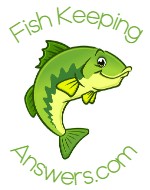Affiliate Disclaimer:
FishKeepingAnswers.com is reader-supported. When you buy through links on our site we may earn a commission.
Red Cherry Shrimp are often touted as the perfect clean-up crew. In fact, many stores sell them as the answer to reducing routine maintenance in an aquarium.
So how true are the claims that Red Cherry Shrimp will clean up your aquarium for you and reduce the amount of routine maintenance you have to carry out?
I think the best way to address this is to look at the things Red Cherry Shrimp WILL do for you and your aquarium, then address the things they WON’T do.
Things Red Cherry Shrimp Will do for your Aquarium
One of the best things about adding Red Cherry Shrimp to an aquarium is their ability to consume the majority of the uneaten food that makes it past your fish.
Whether you have messy eaters like fancy goldfish that chew, then spit out half their food, or you have fish like guppies that are always in a hurry to eat, and end up spreading it around the aquarium as they rush around trying to consume it all. Food inevitably lands in plants or piles of rocks or ends up behind the filter where the fish can’t reach it.
Uneaten food in the aquarium will quickly break down, and as it does it releases ammonia. Ammonia is toxic to fish and, in large enough quantities can even kill the fish.
As the food decomposes it also consumes oxygen from the water itself. Meaning you could end up with your fish struggling to breathe.
Now, these things only happen in tiny amounts, but they can be part of a bigger issue you may have in your aquarium.
Red Cherry Shrimp spend all day in search of food, and they will quickly track down and consume almost any food that the fish fail to eat. Once this food is consumed the danger of it interfering with your water quality is seriously diminished.
On a similar note, Red Cherry Shrimp will also consume the fish poop. It turns out there is some goodness and undigested food in fish poop, and the Red Cherry Shrimp are more than happy to consume some of the poop, breaking it down further and making it easier for the filter to deal with.
Another great reason to add Red Chery Shrimp to your aquarium is they love to eat the starts of algae. Algae is a single-cell organism that starts at a microscopic level. When Red Cherry Shrimp come across these starts, they will quickly consume them, preventing the algae from becoming a bigger issue.
In fact, it is this ability to eat algae that makes Red Cherry Shrimp so popular with aquascapers the world over.
So, There are lots of things Red Cherry Shrimp will do to help with our routine maintenance, but there are things they won’t do.
Things Red Cherry Shrimp Won’t do for your Aquarium
Red Cherry Shrimp will not clear a tank that is already overrun with algae. You would need an army of Red Cherry Shrimp to tackle an aquarium that was overrun with algae, and even then they probably would not solve the problem.
Red Cherry Shrimp will readily eat the starts of algae, but they only eat at an almost microscopic level, meaning large quantities of algae will grow faster than they can consume it.
Red Cherry Shrimp also won’t reduce the number of water changes you have to carry out in your aquarium. Water changes are an essential piece of routine maintenance that help keep the water sweet for your fish and prevent nitrate levels from getting too high.
No matter how good a filter your tank has and how many Red Cherry Shrimp you keep, you will still need to carry out partial water changes on a regular basis.
Red Cherry Shrimp also will not clean algae off the aquarium glass. Typically, the algae that grow on our aquarium glass is either green spot algae or green or brown diatom algae.
Red Cherry Shrimp do not have the correct mouth parts to eat these algae. Snails or algae-eating fish will do a better job here for you.
I think it’s fair to say, Red Cherry Shrimp work well as part of a complete ecosystem within an aquarium to help keep the system cleaner and healthier, but it would not be true to say Red Cherry Shrimp will clean your aquarium for you.







